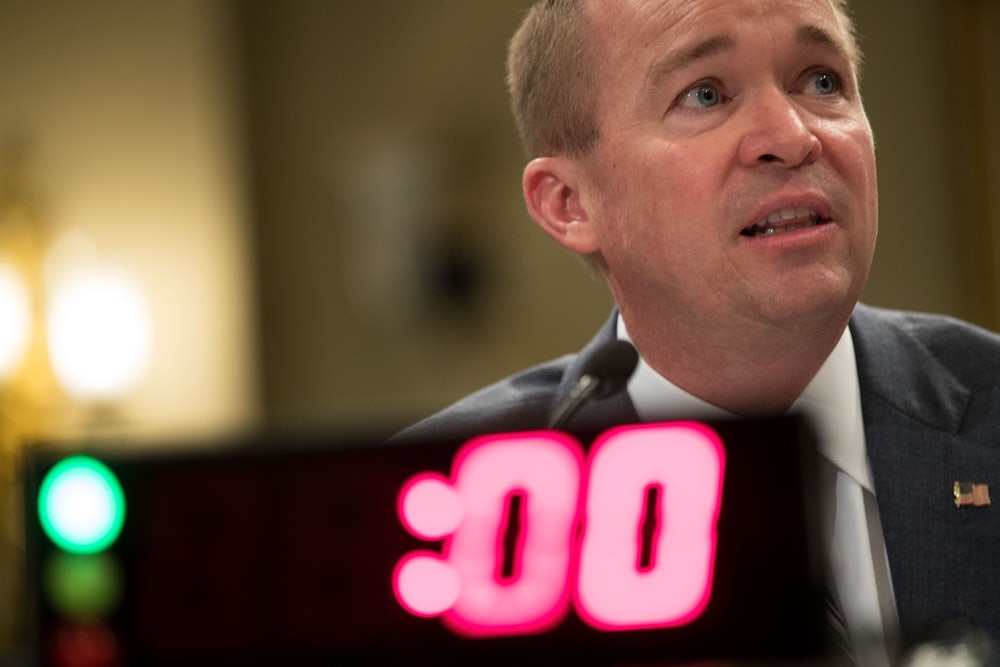When the Republicans’ legislative agenda started drifting sideways early in Donald Trump’s presidency, it became easy to see how their dysfunction could precipitate a massive economic crisis. Just a few months later, we are nearing the brink of such a crisis.
In the wildly optimistic fantasies House Speaker Paul Ryan indulged after the election, his GOP Congress expedited the repeal of the Affordable Care Act, along with huge regressive tax cuts, on a partisan basis, and stapled a debt limit increase onto one of the bills before the summer. Those two main initiatives are now indefinitely waylaid, leaving Congress facing the prospect of increasing the debt limit through regular order, the rules and dynamics of which would require Republicans and Democrats to act together. Failure would leave the United States vulnerable to defaulting on its own debt, sinking the domestic and global economies through sheer incompetence.
A more accurate way to say this is that staving off catastrophe will likely require Democrats to rescue Republicans from their own extremism by providing Republican leaders a lot of votes. Democrats will thus be tempted to demand concessions from congressional Republicans in exchange for those votes. In general, indulging those temptations is a disastrous idea—but it is also possible to imagine Democrats using the GOP’s bind, and general disarray, to end debt limit brinkmanship forever.
Intuitively, a bipartisan debt limit increase should be easier to imagine than one Republicans pass on their own. But intuition is misleading in this case. Passing a debt limit increase on a partisan basis would have been fairly easy for Republicans to do as a rider on a big piece of filibuster-proof legislation that the entire party was excited about. Like, say, massive tax cuts for the rich.
Outside of that context, things look much different. During the Obama years, Republicans transformed the debt limit “from a cheap partisan talking point into a sharp-edged spear used to extract policy concessions,” as Vox’s Matt Yglesias wrote on Tuesday. The legacy of that extreme tactical change has been to leave the Republican Party divided over whether the debt limit should be raised without hostage-taking—even under Republican rule.
Thus, Republicans today find themselves in this predicament: Steve Mnuchin, Trump’s treasury secretary, says that it’s “absolutely critical” that Congress promptly pass a clean debt limit increase, while Trump budget director Mick Mulvaney—a second-rate ideologue—says the administration may insist Congress attach right-wing spending cuts to any legislation that increases the debt limit. Politico reports that privately, and at the moment, Trump is siding with Mnuchin in this disppute. But Mulvaney, a congressman before his recent appointment, is joined in his reckless posture by his old allies in the ultraconservative House Freedom Caucus, and it’s easy to imagine a handful of hardliners in the Senate—where a stand-alone debt limit can be filibustered—insisting on similar concessions in exchange for their debt-limit votes as well.
It is a near certainty, then, that Congress won’t be able to pass a debt limit increase without Democratic votes, and quite likely that avoiding default will require a considerable number of Democrats—who, unsurprisingly, don’t want to give away their votes for free. “Why would we make it easier for them to pass unpaid-for tax cuts by giving away a vote on raising the debt ceiling,” Senator Chris Murphy told Politico. Senate Minority Whip Dick Durbin seconded Murphy, as did House Minority Leader Nancy Pelosi, who told reporters, “I don’t have any intention of supporting a lifting of the debt ceiling to enable the Republicans to give another tax break to the wealthy in our country.”
Unlike Republican efforts to extort partisan spending cuts from congressional Democrats and Obama in 2011, 2013, and 2015, there is at least a logic to the idea that Democrats shouldn’t feel obligated to abet Republican efforts to cut rich people’s taxes by providing them the borrowing authority required to do so. Especially when Republicans control the whole government.
But Republican debt limit threats under Obama had teeth (and were so reckless) precisely because they insisted on combining debt limit increases and extraneous measures in single bills. In the current legislative environment, the GOP tax agenda and the debt limit are (for better or worse) running on separate tracks. Paul Ryan could pinky swear not to raise taxes in exchange for Democratic debt limit votes, break his promise, and Democrats would have no recourse. In the grand sweep of history, it would be morally perverse for Democrats to allow the United States to default on its debt—vote against a clean increase in the limit—because they were worried Republicans might cut taxes in the future.
What Democrats can fairly demand is a single rule for presidents of both parties. It can’t be the case that debt limit demands are an extortion tool Republicans alone get to wield when they’re out of power, and Democrats shouldn’t be expected to submit to that double standard. Giving Trump enough borrowing authority to get through his presidency without incident does nothing to stop Republicans from reprising their 2011 strategy against the next Democratic president. If Republicans need Democratic help to raise the debt limit, Democrats could fairly seek a multi-decade suspension of the debt limit—or preferably its outright abolition—in exchange for their votes.
If citing opposition to regressive tax cuts as a basis for withholding debt limit votes is a feint by Democrats—to gain leverage toward neutralizing the debt limit threat indefinitely—it would restore much needed stability to the U.S. legislative and financial systems at no cost. But everyone has to tread carefully, not least the Democrats, who by happenstance are far more competent and responsible than the president and his ruling party.
